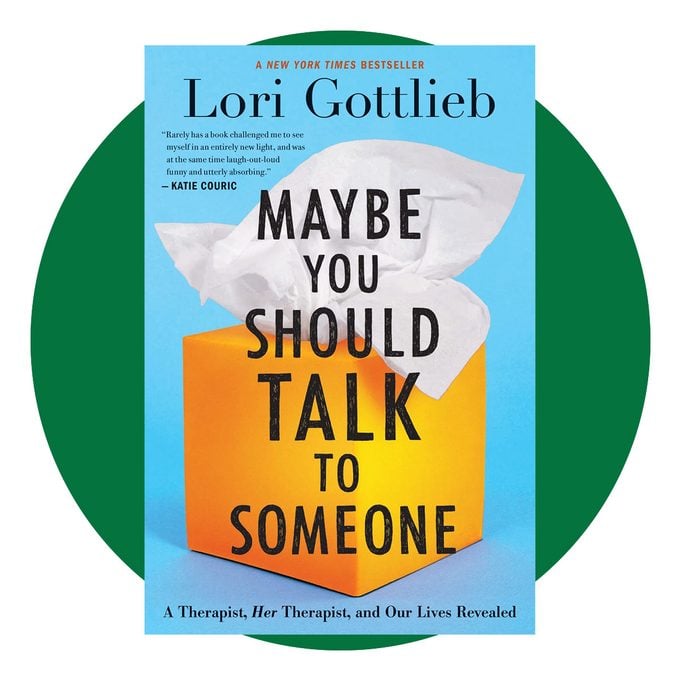Have a Chronic Illness? Here’s a Gentle Script to Set Boundaries, from a Psychotherapist and Bestselling Author
Updated: Jul. 11, 2023

Therapist and New York Times bestselling author Lori Gottlieb wants you to feel comfortable expressing your needs related asthma or another chronic illness.
Recent data from the Asthma and Allergy Foundation of America suggests that 56% of people who have asthma say that they don’t share their condition with others unless they absolutely have to. If you have any type of illness that requires you to put restrictions on the activities you engage in, the places you go, or the foods you eat, you might be able to relate.
Not only is this isolating and painful—but it could also lead to health issues, says psychotherapist Lori Gottlieb, MFT, author of the New York Times bestselling memoir Maybe You Should Talk to Someone: A Therapist, HER Therapist, and Our Lives Revealed. Gottlieb says this reluctance to talk about chronic illnesses definitely doesn’t just affect people with asthma. And with chronic conditions becoming more prevalent (think allergies, autoimmune disorders, long Covid, arthritis, celiac and other gastrointestinal-related conditions), there’s a significant chance that you have one, or know someone who does (even if you aren’t aware of it yet!).
Get The Healthy @Reader’s Digest newsletter

To help get the conversation started, Gottlieb recently partnered with Amgen to create The Air Between Us Campaign. She sat down with The Healthy @Reader’s Digest to talk about her own chronic illness and exactly what to say to people when sharing about your own illness—including one major relationship red flag. (Hint: It’s one of the top three indicators of the success of your relationship!)
How a Nearly Fatal Bee Pollen Allergy Triggered My Adult-Onset Asthma
Lori Gottlieb on chronic illness awareness
The Healthy @Reader’s Digest: What’s inspiring you to talk about awareness of asthma and other chronic illnesses right now?
Lori Gottlieb: This is really close to my heart because I have my own experience with chronic illness and I understand how hard it can be to talk about it. I have people come to therapy to talk about it because they don’t know how to talk about it with the people in their lives. But if you don’t share this with others, you start to feel very alone and you can’t get the support that you need—and the people around you want to help, and they want to be able to support you.
The Healthy: For someone who worries about being seen as a hypochondriac, or believe people won’t understand or be sympathetic, how do you start that conversation?
Lori Gottlieb: Start with explaining what a chronic illness is. Lots of people don’t understand that a chronic illness is exactly that: Chronic. Sometimes it flares and you can see the symptoms. Like with asthma, for example, sometimes it’s very apparent: Oh wow, this person’s really struggling to breathe. But other times it seems [from the outside] like the person’s fine. This may make people think it isn’t as serious as it really is—asthma can be life threatening—and they need to know that just because you can’t see the symptoms doesn’t mean the person doesn’t still have the condition.
6 Reasons Smoking Weed With Asthma Is a Bad Idea
Lori Gottlieb on how to talk about chronic illness
The Healthy: Is there a script for talking to someone about your own chronic illness, whether that’s with friends or someone new you’re dating or in the workplace?
Lori Gottlieb: I think the first thing is education. Say, “I have a chronic condition—asthma. Let me tell you a little bit about how it affects me.” For example, “I can’t be around cologne or perfume or pollen because it triggers me and I can’t breathe.”
Then follow up with how they can help you. “I can go to the dinner party, but I just want to make sure people aren’t wearing cologne or smoking.”
In terms of the workplace, tell your HR person and your manager early on. You can explain that there might be times when you’re affected by your condition and share what your symptoms might be. Say, “I just want you to know in advance so you understand what’s happening.”
In every situation, you want to make it clear that you can live a full life, you will get the job done, but there may be some situations where you have to make accommodations.
I Love to Run. Here’s How I Do It With Exercise-Induced Asthma
The Healthy: What kind of reaction should you look for when you open up with someone about your chronic illness?
Lori Gottlieb: The right response would be, “Thank you for telling me, please let me know what I can do to help you.”
But I think their reaction says something bigger, about the person’s capacity to be relational, especially if they’re someone who could potentially be a close friend or partner. Having a chronic condition is not a negative thing, it’s just a thing that comes with you, like we all have things that come with us. So if someone isn’t empathetic to that or doesn’t listen, it shows that they’re not flexible—which is a red flag in any relationship. In fact, when they do studies of marriage and they look at the qualities that predict the success of a marriage, flexibility is in the top three.
So think of this as a silver lining of having a chronic condition—you learn very quickly who has the qualities that you’re looking for in a really meaningful relationship.
Lori Gottlieb on what she wants people to know about chronic illness
The Healthy: What’s your main takeaway message you want people to understand from this?
Lori Gottlieb: I want people to be open about the fact that they have a chronic condition instead of hiding it or feeling shame around it. A big worry some sufferers have is feeling like they’re going to be a burden on somebody else, but usually we find when people talk about it, the other person isn’t burdened and may even feel honored you told them. It can bring you closer.
People who care about you want you to be comfortable, and they may feel bad if you don’t tell them what your triggers are. Like they may say, “I wish you had just told me! I wouldn’t have had that scented candle here when you came over last time. I saw that you were uncomfortable, but I didn’t know why.”
It also gives them a space to talk if they have things they might want to share with you.
The Healthy: What should people do if they have more questions?
Lori Gottlieb: We created guides, templates and videos, where I actually model how to talk about chronic illnesses, for The Air Between Us All. Having these tools will hopefully help you feel more confident having these conversations.
Follow The Healthy @Reader’s Digest on Facebook, Instagram, and Twitter. Keep reading:
- Matteo Lane on Why We Need to Laugh: “Comedy Can Ease the Pain of the World Around You”
- This Is What Your Therapist First Notices About You
- Using Your Phone for This Many Hours Daily Causes High Blood Pressure, Says New Study
- This Is What a Dermatologist First Notices About You
This interview has been edited for length and clarity.

















